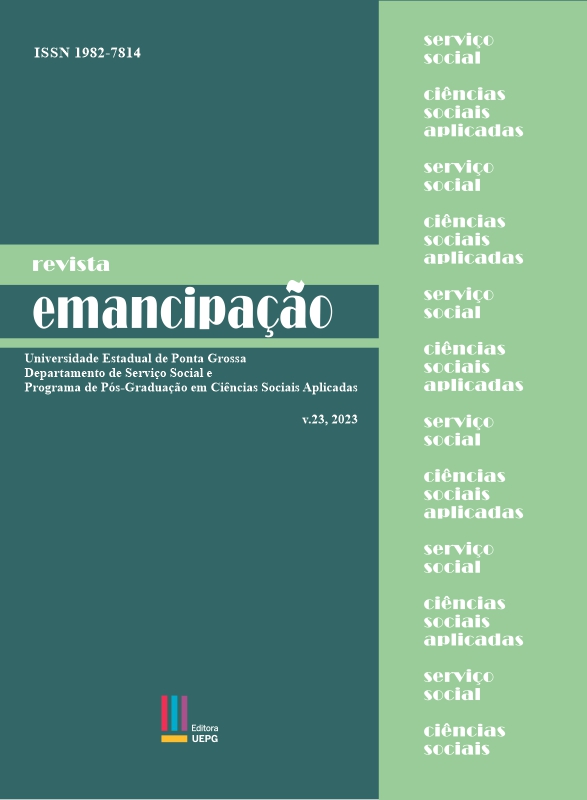Gender relations and perspectives of professional insertion of female students of Veterinary Medicine at Unifesspa, campus Xinguara - PA, Brazil
Main Article Content
Abstract
Veterinary Medicine experiences an increase in the number of female professionals. They tend to be incorporated into areas related to companion animals, to the detriment of other areas of activity. Thus, the study aimed to analyze the perspectives of professional insertion of female students of Veterinary Medicine at Unifesspa, campus of Xinguara/PA, trying to perceive gender inequalities. Data were collected through questionnaires answered by professors and students, of both sexes, from the Unifesspa Veterinary Medicine course. Qualitative data were analyzed using content analysis and quantitative data submitted to descriptive statistics. Although a large part of the student body does not agree with the sexist assumptions that permeate Veterinary Medicine, a sexual division of labor persists, reinforced by some professors and agricultural producers in the region. The sexual division of labor dissuades the insertion of undergraduates in work related to production animals, considered male attributions.
Downloads
Article Details

This work is licensed under a Creative Commons Attribution 4.0 International License.
Autores que publicam nesta revista concordam com os seguintes termos:
a) Os autores mantém os direitos autorais e concedem à revista o direito de primeira publicação, com o trabalho simultaneamente licenciado sob a Creative Commons Attribution License (https://creativecommons.org/licenses/by/4.0/deed.pt_BR) que permite o compartilhamento do trabalho com reconhecimento da sua autoria e publicação inicial nesta revista.
b) Esta revista proporciona acesso público a todo o seu conteúdo, uma vez que isso permite uma maior visibilidade e alcance dos artigos e resenhas publicados. Para maiores informações sobre esta abordagem, visite Public Knowledge Project, projeto que desenvolveu este sistema para melhorar a qualidade acadêmica e pública da pesquisa, distribuindo o OJS assim como outros softwares de apoio ao sistema de publicação de acesso público a fontes acadêmicas. Os nomes e endereços de e-mail neste site serão usados exclusivamente para os propósitos da revista, não estando disponíveis para outros fins.
This journal provides open any other party.
Esta obra está licenciada sob uma Licença Creative Commons.
https://creativecommons.org/licenses/by/4.0/deed.pt_BR.

References
BARROS, R. A. Tornar-se médica(o) veterinária(o): o papel do currículo oculto e das trajetórias sociais na formação acadêmica. 145f. Tese (Doutorado em Medicina Veterinária) – Universidade Federal de Viçosa, Viçosa, MG, Brasil, 2021. Disponível em: https://www.locus.ufv.br/handle/123456789/28751. Acesso em: 8 fev. 2023.
BEGENY, C. T.; RYAN, M. Gender discrimination in the veterinary profession: a brief report of the BVA Employers’ Study 2018, 2018. Disponível em: https://ore.exeter.ac.uk/repository/bitstream/handle/10871/36424/BVA%20Employers%20Study_Brief%20Report_Final%20Draft.pdf?sequence=1. Acesso em: 8 nov. 2022.
BENGOA, C. C. A economia feminista: um panorama sobre o conceito de reprodução. Temáticas, v. 26, n. 52, p. 31-68, ago./dez. 2018. Disponível em: https://econtents.bc.unicamp.br/inpec/index.php/tematicas/article/view/11703. Acesso em: 26 maio 2023.
BOURDIEU, P. A dominação masculina. 11 ed. Rio de Janeiro: Bertrand Brasil, 2012.
CONSELHO FEDERAL DE MEDICINA VETERINÁRIA (CFMV). Censo. 2020. Disponível em: https://www.cfmv.gov.br/censo/transparencia/2017-2020/2020/12/11/. Acesso em: 1 fev. 2023.
CONSELHO REGIONAL DE MEDICINA VETERINÁRIA DE SÃO PAULO (CRMV/SP). História da Medicina Veterinária, 2022. Disponível em: https://crmvsp.gov.br/historia-da-medicina-veterinaria/. Acesso em: 8 nov. 2022.
ESPINOZA, A. M.; ALBORNOZ, N. Sexismo en Educación Superior: ¿Cómo se Reproduce la Inequidad de Género en el contexto Universitario? Psykhe, v.32, n.1, p. 1-37, 2023. Disponível em: http://ojs.uc.cl/index.php/psykhe/article/view/35613. Acesso em: 12 fev. 2023.
HENRY, C.; JACKSON, E. Women’s entrepreneurship and the future of the veterinary profession. e-Organisations & People, v. 22, n. 3, p. 34-42, 2015. Disponível em: https://www.researchgate.net/publication/284020005_Women's_entrepreneurship_and_the_future_of_the_veterinary_profession. Acesso em: 8 nov. 2022.
INSTITUTO BRASILEIRO DE GEOGRAFIA E ESTATÍSTICA (IBGE). Censo Agropecuário: tabela 6754 - número de estabelecimentos agropecuários e área dos estabelecimentos agropecuários, por tipologia, condição legal das terras, grupos de atividade econômica e grupos de área total. IBGE: 2017. Disponível em: https://sidra.ibge.gov.br/tabela/6754. Acesso em: 26 maio 2023.
INSTITUTO BRASILEIRO DE GEOGRAFIA E ESTATÍSTICA (IBGE). Cidades: Xinguara/PA, 2018. Disponível em: https://cidades.ibge.gov.br/brasil/pa/xinguara/pesquisa/18/16459. Acesso em: 8 nov. 2022.
FREITAS, S. L. R. et al. Diferenças entre os gêneros na assistência técnica e extensão rural realizada por médicos veterinários: paradigma ou preconceito. Ceres, v. 61, n. 1, p. 1-8, 2014. Disponível em: https://www.scielo.br/j/rceres/a/BvCXZHk8Yjhb4xySyXfDFmn/?lang=pt#:~:text=Concluiu%2Dse%20que%20as%20diferen%C3%A7as,e%20o%20senso%20de%20organiza%C3%A7%C3%A3o. Acesso em: 16 dez. 2021.
IRVINE, L.; VERMILYA, J. R. Gender work in a feminized profession: the case of Veterinary Medicine. Gender & Society, v. 24, n. 1, p. 56-82, 2010. Disponível em: https://doi.org/10.1177/089124320935597. Acesso em: 17 dez. 2021.
LEPE-LÓPEZ, M. et al. Incremento del número de estudiantes del género femenino
egresados de la carrera de medicina veterinaria en Guatemala. Ciencias Sociales y Humanidades, v. 5, n. 2, s.p., 2018. Disponível em: https://revistas.usac.edu.gt/index.php/csh/article/view/686. Acesso em: 12 fev. 2023.
LOFSTEDT, J. Gender and veterinary medicine. The Canadian Veterinary Journal, v. 44, n. 7, p. 533-535, 2003. Disponível em: https://www.ncbi.nlm.nih.gov/pmc/articles/PMC340187/. Acesso em: 8 nov. 2022.
LOPES, L. M.; DREBES, L. M. Trabalho feminino na bovinocultura de corte no Sudeste do Pará. In: CONGRESSO INTERNACIONAL INTERDISCIPLINAR EM SOCIAIS E HUMANIDADES, 11., 2021, Marabá. Anais... Marabá: Associação Nacional de Pesquisa e Pós-Graduação Interdisciplinares em Sociais e Humanidades, 2021.
MORAES, E. M. V.; DREBES, L. M. Educação em solos e pecuarização na Amazônia Oriental: sobre o desafio da sustentabilidade em Xinguara/PA. In: CONGRESSO DA SOBER, 58., 2020, Foz do Iguaçu. Anais... Foz do Iguaçu: Sociedade Brasileira de Economia, Administração e Sociologia Rural, 2020.
NEVES, D. P.; MEDEIROS, L. S. (Orgs.). Mulheres camponesas: trabalho produtivo e engajamentos políticos. Niterói: Alternativa, 2013.
OSÓRIO, A. Ecofeminismo, teorias do care e as críticas a protetoras de animais de rua. Revista Estudos Feministas, v. 26, n. 3, p. 1-20, 2018. Disponível em: https://www.scielo.br/j/ref/a/g37rWjtX3hrs7H3Q5hLNHgM/?format=pdf&lang=pt. Acesso em: 8 nov. 2022.
SCOTT, J. Gender: a useful category of historical analyses. The American Historical Review, v. 91, n. 05, p. 1053-1075, 1986.
VEIGA, J. B.; TOURRAND, J. F.; QUANZ, D. A pecuária na fronteira agrícola da Amazônia: o caso do município de Uruará, PA, na região Transamazônica. Belém: EMBRAPA, 1996. Disponível em: https://ainfo.cnptia.embrapa.br/digital/bitstream/item/60974/1/CPATU-Doc87.pdf. Acesso em: 26 maio 2023.
VERSCHUUR, C.; CATARINO, C. Genre, migrations et globalistaion de la reproduction sociale. L’Harmattan: Genève, 2013.

